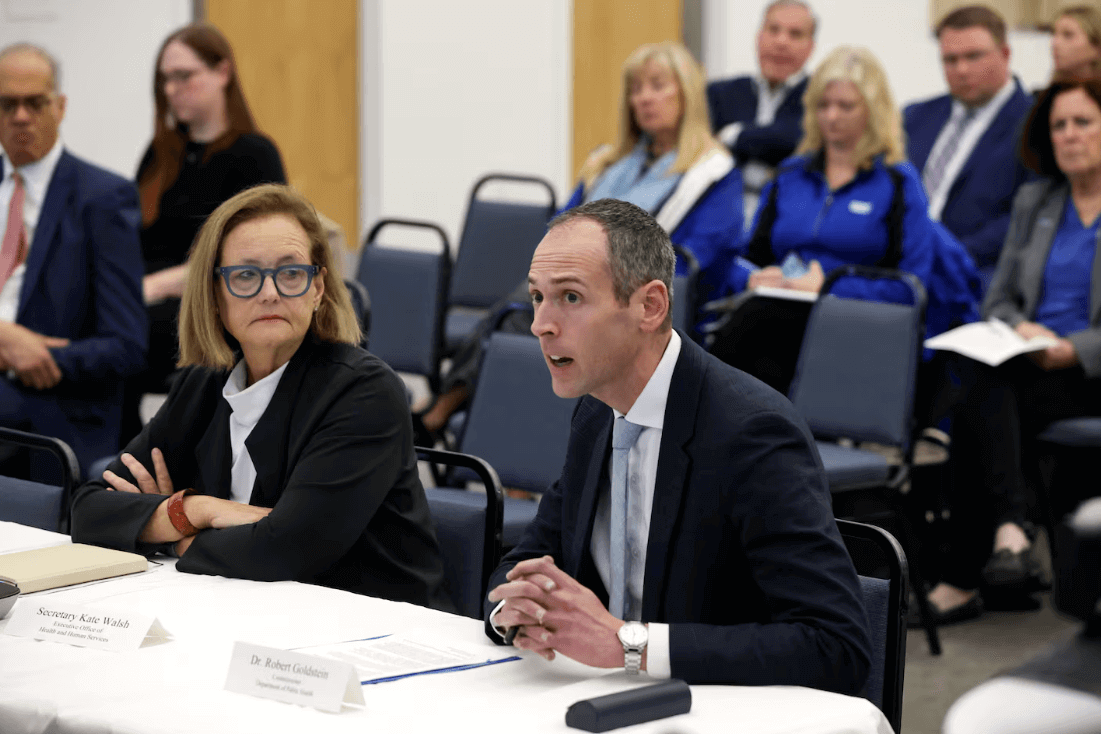新英格兰地区将失去超过 1 亿美元的联邦医疗项目资金

【中美创新时报2025 年 3 月 27 日编译讯】(记者温友平编译)马萨诸塞州政府官员周三表示,特朗普政府为收回数十亿美元的联邦拨款而采取的大规模行动预计将使新英格兰各州损失超过 1 亿美元的公共卫生项目拨款。《波士顿环球报》记者杰森·劳克林克里斯托弗·加文和阿曼达·戈基对此作了下述报道。
马萨诸塞州的具体损失金额尚不清楚,但罗德岛州官员预计该州将损失 3100 万美元,而新罕布什尔州将损失 8000 万美元。
马萨诸塞州公共卫生专员罗比·戈德斯坦博士在一份声明中表示,失去通过疾病控制和预防中心发放的这笔拨款“可能会对公共卫生造成毁灭性打击”。
马萨诸塞州官员仍在试图计算资金损失,但指出,约 1 亿美元的目标拨款中的大部分是受到保护的,因为这些资金已经被承诺;在其他情况下,撤销将迫使马萨诸塞州中断现有合同,州政府官员说。
药物滥用和精神健康服务管理局也突然终止了对马萨诸塞州精神健康部的奖励。
罗德岛州检察长彼得·内罗尼亚 (Peter Neronha)周二在最先报道该州预算削减的 WPRI 节目中表示,他计划对预算削减提出抗议,并指出这笔资金涵盖了儿童疫苗接种和该州对未来流行病的应对等工作。
“政府必须做出决定,”尼罗尼亚说。“要么我们继续以政府的资金开展这项工作,要么我们干脆不做。”
乔治城大学法学院宪法专家戴维·苏佩尔 (David Super) 表示,他希望了解更多有关政府撤回 CDC 资金的法律依据的信息,但对此举是否合法表示怀疑。
他说:“从表面上看,这似乎是国会又一次非法扣押资金。”
损失的原因是特朗普政府决定撤回疾控中心向州和地方公共卫生机构和组织提供的超过 110 亿美元的新冠肺炎相关资金,这些资金最初是在新冠肺炎疫情最严重时期拨付的。联邦官员表示,这笔资金主要用于新冠肺炎检测、疫苗接种和其他项目,包括一项旨在解决高风险和服务不足患者之间的新冠肺炎差异的项目。
据美联社报道,CDC 从周一开始向地方和州卫生部门发出终止通知。CDC 预计将在大约 30 天内开始收回这笔资金。
美国卫生与公众服务部在一份声明中表示:“新冠肺炎疫情已经结束,卫生与公众服务部将不再浪费数十亿美元的纳税人资金去应对美国人多年前就已经摆脱的根本不存在的疫情。”
这笔钱将用于解决新英格兰地区超出 COVID 范围的卫生服务。三个州的官员表示,疫苗接种推广、州公共卫生实验室和社区卫生中心都依赖 CDC 的资金。
马萨诸塞州社区卫生中心联盟首席执行官迈克尔·库里表示:“任何对 CDC 资金的削减都会使我们的国家更加病态,并会削弱预防保健方面的努力。”
医疗专家和医疗服务提供者仍在等待联邦政府削减开支的具体细节,这一损失仍让他们感到震惊。
波士顿大学公共卫生学院社区卫生实践教授哈罗德·考克斯是马萨诸塞州 公共卫生委员会成员,该委员会参与制定该州的法规和条例,他表示,他对削减的影响深感担忧。
“我想知道,政府准备采取什么措施来弥补这一缺陷,”他说。
根据马萨诸塞州州长莫拉·希利 (Maura Healey) 的声明,疾病预防控制中心的资金支持了禽流感等呼吸道疾病的治疗和检测、提高疫苗接种率的项目以及对社区卫生中心的支持。
“马萨诸塞州依赖这笔资金,”希利在声明中说。“唐纳德·特朗普当选后承诺让人们的生活更便宜、更健康、更轻松,但他却在所有这些方面让我们倒退。”
波士顿公共卫生委员会报告称,委员会失去了两笔用于支持应急响应和疫情防控、心理健康服务和疫苗推广的拨款。波士顿公共卫生专员比索拉·奥吉库图博士表示,这些拨款即将到期,因此不会对该市的卫生服务产生重大影响,但她对委员会突然失去合法拨给该市的资金感到不安。
奥吉库图在一份声明中表示:“我们非常担心,这些补助金在全国范围内以前所未有的方式未经通知就被终止。”
参议员乔安妮·科默福德 (Joanne Comerford) 是来自北安普敦的民主党人,也是改善当地公共卫生服务的倡导者,她表示,她了解到疾控中心的部分资金用于支付流行病学家和公共卫生护士在当地小型卫生部门工作的费用。
她表示:“当我们意识到新冠疫情爆发五周年这一里程碑时,我们感到很痛苦。”
在新罕布什尔州,卫生与公众服务部专员洛里·韦弗撤回了正在考虑的依赖联邦资金的合同,包括同侪支持认证计划、传染病监测和危机行动中心。州长凯利·A·阿约特在其他问题上与特朗普立场一致,但不同意突然削减资金。
她说:“我们将研究现在能做些什么来确保依赖国家服务的人们不会受到影响。”
就在美国国立卫生研究院终止全国数千万美元卫生研究经费几天后,疾病预防控制中心就宣布削减预算。
波士顿大学公共卫生学院社区卫生科学系主任卡洛斯·罗德里格斯-迪亚兹 (Carlos Rodriguez-Diaz) 表示:“我们看到的是对健康的明显攻击。”他的研究也失去了联邦资助。“一方面,我们正在减少用于维持人们健康的资源。另一方面,我们正在取消研究项目。”
《波士顿环球报》的 Alexa Gagosz 对本报告做出了贡献。
题图:马萨诸塞州州卫生与公众服务部部长凯特·沃尔什 (Kate Walsh) 和公共卫生部专员罗比·戈德斯坦 (Robbie Goldstein) 博士出席 2024 年 4 月的听证会。乔纳森·威格斯 (Jonathan Wiggs)/《环球报》工作人员
附原英文报道:
New England to lose more than $100 million in federal funding for state health programs
By Jason Laughlin, Christopher Gavin and Amanda Gokee Globe Staff,Updated March 26, 2025
State Health and Human Services Secretary Kate Walsh and Department of Public Health Commissioner Dr. Robbie Goldstein at a hearing in April 2024.Jonathan Wiggs/Globe Staff
A sweeping effort by the Trump administration to reclaim billions in federal grant money is expected to cost New England states more than $100 million that had been targeted for public health programs, state officials said Wednesday.
The exact amount in Massachusetts is unclear, but officials in Rhode Island expect the state to lose $31 million, while New Hampshire is poised to lose $80 million.
Losing the grants, which were distributed through the Centers for Disease Control and Prevention, is “potentially devastating to public health,” Massachusetts Public Health Commissioner Dr. Robbie Goldstein said in a statement.
Massachusetts officials are still trying to calculate the loss of funds, but noted that much of some $100 million in grants that were targeted is protected because the funds are already obligated; in other cases, the recision would force Massachusetts to break existing contracts, state officials said.
The Substance Abuse and Mental Health Services Administration has also abruptly terminated awards to Massachusetts’s Department of Mental Health.
‘A clear case of censorship’: Trump’s attacks on DEI have upended scientific research
Speaking Tuesday on WPRI, which first reported the cuts in Rhode Island, state Attorney General Peter Neronha said he plans to fight the recision, noting the funding covered efforts such as childhood vaccination and the state’s response to future pandemics.
“The state is going to have to make a decision,” Neronha said. “Either we’re going to continue doing this work at the state’s expense, or not do it at all.”
David Super, a Georgetown Law constitutional law expert, said he wanted more information on the legal basis for the administration’s pullback of CDC money but was skeptical the move was legal.
“On the face of it, this appears to be another illegal impoundment of funds that Congress has appropriated,” he said.
The losses are the result of the Trump administration’s decision to pull back more than $11 billion in COVID-19-related funding from the CDC to state and local public health agencies and organizations that initially was awarded during the height of the COVID 19 pandemic. Federal officials said the money largely covered COVID-19 testing, vaccinations, and other projects, including a program aimed at addressing COVID disparities among high-risk and underserved patients.
The CDC began sending out the termination notices to local and state health departments on Monday, according to the Associated Press. The CDC expects to start recouping the money in about 30 days.
“The COVID-19 pandemic is over, and HHS will no longer waste billions of taxpayer dollars responding to a non-existent pandemic that Americans moved on from years ago,” the US Department of Health and Human Services said in a statement.
That money is used to address health services in New England that go well beyond COVID. Officials in three states said vaccination outreach, state public health laboratories, and community health centers all relied on the CDC funds.
“Any cuts to CDC funds will make our country sicker and will weaken efforts around preventative care,” said Michael Curry, chief executive of the Massachusetts League of Community Health Centers.
The loss left health experts and providers reeling even as they waited for details on how deeply the federal cuts would bite.
Harold Cox, a professor of community health practices at Boston University School of Public Health and a member of Massachusetts’ Public Health Council, which helps shape rules and regulations in the state, said he had grave concerns about the impact of the cuts.
“I want to know, what is the state prepared to do to help make up for some of this,” he said.
In Massachusetts, the CDC funds supported treatment and testing for respiratory diseases, such as bird flu, programs to improve vaccine uptake, and support for community health centers, according to a statement from Governor Maura Healey.
“Massachusetts depends on this funding,” Healey said in the statement. “Donald Trump was elected and promised to make life cheaper, healthier, and easier for people, but he’s taking us backwards on all of those fronts.”
The Boston Public Health Commission reported losing two grants that supported emergency response and pandemic preparation, mental health services, and vaccine outreach. The grants were slated to expire and their loss shouldn’t significantly affect the city’s health services, the city’s public health commissioner, Dr. Bisola Ojikutu, said, but she was troubled by the way her agency abruptly lost money legally committed to the city.
“We are very concerned,” Ojikutu said in a statement, “at the unprecedented way in which these grants have been terminated across the country without notice.”
Senator Joanne Comerford, a Democrat from Northampton and advocate for improving local public health services, said she learned some of the CDC money helped pay for epidemiologists and public health nurses to work at small local health departments.
“It’s a bitter reality as we recognize this five-year milestone since the onset of the announcement of the COVID pandemic,” she said.
In New Hampshire, Department of Health and Human Services Commissioner Lori Weaver withdrew contracts under consideration that would have relied on the federal money, including a peer support certification program, infectious disease surveillance, and a crisis operations center. Governor Kelly A. Ayotte has aligned with Trump on other issues, but disagreed with the sudden funding cut.
“We will look and see what we can do now to make sure that people who rely on the services of the state aren’t disrupted,” she said.
The CDC cuts came just days after the National Institutes of Health terminated tens of millions in health research grants nationally.
“What we are seeing is a clear attack on health,” said Carlos Rodriguez-Diaz, chair of community health sciences at the Boston University School of Public Health, who separately has also lost federal funding for his research. “On one hand, we are reducing the resources to keep people healthy. On the other hand we are eliminating research programs.”
Alexa Gagosz of the Globe staff contributed to this report.

